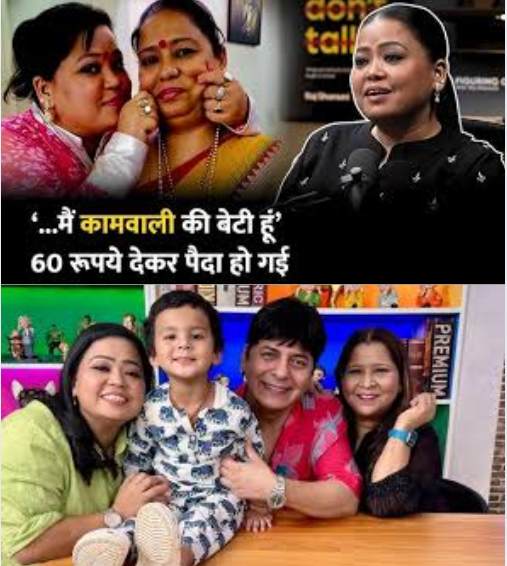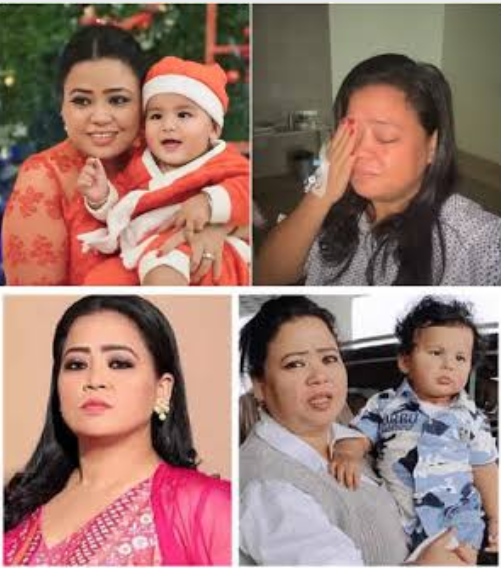Comedian Bharti Singh Opens Up About Her Childhood Struggles With Mother And Family
In a world where glamour and glitz often mask the truth of celebrity lives, few public figures open up about their past as courageously and unflinchingly as Bharti Singh. Today, she is celebrated as India’s first prominent female stand-up comedian, widely recognized as the “Laughter Queen” of the nation. Her quick wit, comic timing, and radiant personality have won millions of hearts. But beneath the layers of laughter lies a childhood filled with adversity, loss, and survival. Her recent interview with Raj Shamani brought these realities into the spotlight, allowing the world to see the pain that forged the woman who now makes others laugh for a living.
Bharti’s story begins in Amritsar, Punjab, in a household that knew hardship all too well. She lost her father at a very young age, an event that would change the course of her life entirely. With no male breadwinner in a conservative society, her mother was forced to take on the role of both mother and father. Bharti recalled in the interview how her mother went from house to house working as a domestic help just to ensure her children were fed. It wasn’t just about money—it was about dignity, survival, and sacrifice.
Bharti spoke about the pain of watching her mother return home bruised, exhausted, and sometimes even injured after a day of strenuous labor. She remembered her mother being scolded by employers, insulted, and reduced to tears. And yet, she returned every day, driven by the singular purpose of providing for her children. For many, Diwali is a festival of joy, light, and celebration. But for Bharti and her family, it was a day of longing. They would wait eagerly for their mother to return from work, knowing she might bring home leftover sweets gifted by her employers. There was no money for fireworks or new clothes, and the only gifts they received were hand-me-downs from others.
Her mother, Bharti revealed, was a beautiful woman. She could have remarried and perhaps found an easier life for herself. But she chose not to. She chose to become a house help rather than depend on anyone else. That fierce independence was passed on to Bharti, who often accompanied her mother to work. She remembered how women in those households would instruct her mother on how to mop properly or criticize her cooking. And yet, when these same employers offered leftover food—kofta or dal makhani—Bharti and her siblings would light up with joy. What was discarded by others was a feast in their eyes.
In the same interview, Bharti revealed a heartbreaking detail that few knew: she was an unwanted child. Her mother, already struggling with two children—a son and a daughter—couldn’t imagine raising a third. Unaware of her pregnancy until a few months in, Bharti’s mother tried everything to end it. She consumed bitter herbs, consulted local babas, ate foods believed to cause miscarriages, and even physically exerted herself in the hope that the child would not survive. But Bharti did survive. In fact, she was born at home, without a hospital, without a doctor. Her mother gave birth to her alone, in the middle of the night. A midwife was called only to cut the umbilical cord, and she charged ₹60 for the service.

“I’m a ₹60 child,” Bharti said in the interview. Her words weren’t self-deprecating—they were a reminder of how little value was placed on her existence at the time. But today, that same woman—once considered a burden—has gifted her mother a home worth ₹1.6 crore. That house is not just made of cement and bricks; it’s built on memories, on sacrifices, on years of silent endurance. For Bharti, it is a symbol of a full circle—a journey from being unwanted to being indispensable.
She also spoke about how, despite her rocky start, her mother eventually gave her all the love she needed. Once Bharti was born, her mother did not hold back. She raised her with the same affection as her other children, if not more. Her guilt, perhaps, transformed into an even stronger bond. Bharti’s words were not filled with bitterness; rather, they reflected deep empathy for what her mother had to go through.
Bharti Singh’s rise in the Indian entertainment industry is not just a tale of talent but of defiance. In a male-dominated field, where women are often expected to be eye candy or play second fiddle, Bharti emerged as a lead performer. She brought a kind of raw, street-smart comedy that connected with the masses. Her humor was not rehearsed or elitist—it came from real-life observations, from the world she had lived in. She laughed at herself before anyone else could, using her own body, background, and accent as material not for mockery, but for empowerment.
Over time, Bharti became a household name. Whether as a host, a contestant, or a performer on various television shows, she carved out a unique identity. Her confidence, charisma, and authenticity made her relatable to millions across the country. What made her stand out even more was that she never tried to hide her background. She wore her past like a badge of honor. In a world where many try to erase their struggles once they achieve success, Bharti embraced hers and spoke about it with pride.
Her story resonates especially with women across India who are often told to settle, to make peace with limitations, to accept what society decides for them. Bharti’s journey shatters those limitations. She didn’t just dream of getting married and settling down. She dreamed of building a life, a career, a legacy—and she did. Her success sends a powerful message to young girls: your worth is not defined by your gender, your weight, your bank balance, or the circumstances of your birth. It is defined by what you choose to do with your life.

Today, Bharti is not just a comedian. She’s a role model. Her life is a case study in resilience. From eating leftover food to dining with the stars, from being unwanted to being adored, from ₹60 to ₹1.6 crore—her transformation is nothing short of cinematic. Yet, it’s real. And that’s what makes it beautiful.
The emotional impact of her story cannot be overstated. Her honesty in recounting such painful memories was not meant to gain sympathy, but to inspire. She wanted people to know that behind every success story lies a series of battles that were fought silently. Not every warrior wears armor—some wear smiles and crack jokes on stage. But they are warriors, nonetheless.
In an era where social media often presents filtered perfection, Bharti’s truth stands out. It reminds us of the power of raw, unfiltered humanity. Of a little girl who was once nearly erased before she could take her first breath, and who grew up to make the whole country laugh. Her journey is a testament to the fact that where you come from doesn’t define where you can go. It is a story of hope, grit, love, and laughter.
As Bharti herself might say, it’s okay to be born in adversity—as long as you refuse to stay there. Today, her story is not just hers anymore. It belongs to every girl who was told she wasn’t enough, to every child who went to bed hungry, to every mother who chose to fight rather than flee.
In the end, Bharti Singh didn’t just rise—she lifted others with her.
Play video :
News
Sachin Tendulkar’s Son Arjun Tendulkar Gets Engaged To Saaniya Chandhok | Who Is Saaniya Chandhok?
Sachin Tendulkar’s Son Arjun Tendulkar Gets Engaged To Saaniya Chandhok | Who Is Saaniya Chandhok? In a surprising yet joyous…
Navya Naveli Insults Rekha After Amitabh Bachchan And Rekha Marriage Decision
Navya Naveli Insults Rekha After Amitabh Bachchan And Rekha Marriage Decision In the world of Bollywood, few stories are as…
Puneet Superstar Was Beaten Up Publicly On The Road In Delhi
Puneet Superstar Was Beaten Up Publicly On The Road In Delhi In a disturbing turn of events that has left…
KHUSHI KAPOOR & REBEL KIDS BULKY VENEERS: KUSHA KAPILA’S SMILE TRANSFORMATION
KHUSHI KAPOOR & REBEL KIDS BULKY VENEERS: KUSHA KAPILA’S SMILE TRANSFORMATION In recent years, cosmetic dentistry has surged in popularity,…
JENNIFER WINGET’S EX HUSBAND WAS MANIPULATIVE: BIPASHA & KARAN SINGH GROVER BEING SELF OBSESSED
JENNIFER WINGET’S EX HUSBAND WAS MANIPULATIVE: BIPASHA & KARAN SINGH GROVER BEING SELF OBSESSED In the Indian entertainment industry, few…
Aishwarya Rai Bachchan Donate Her Blue Eyes, Salman Khan Donate His Bone Marrow
Aishwarya Rai Bachchan Donate Her Blue Eyes, Salman Khan Donate His Bone Marrow In a world increasingly shaped by celebrity…
End of content
No more pages to load









